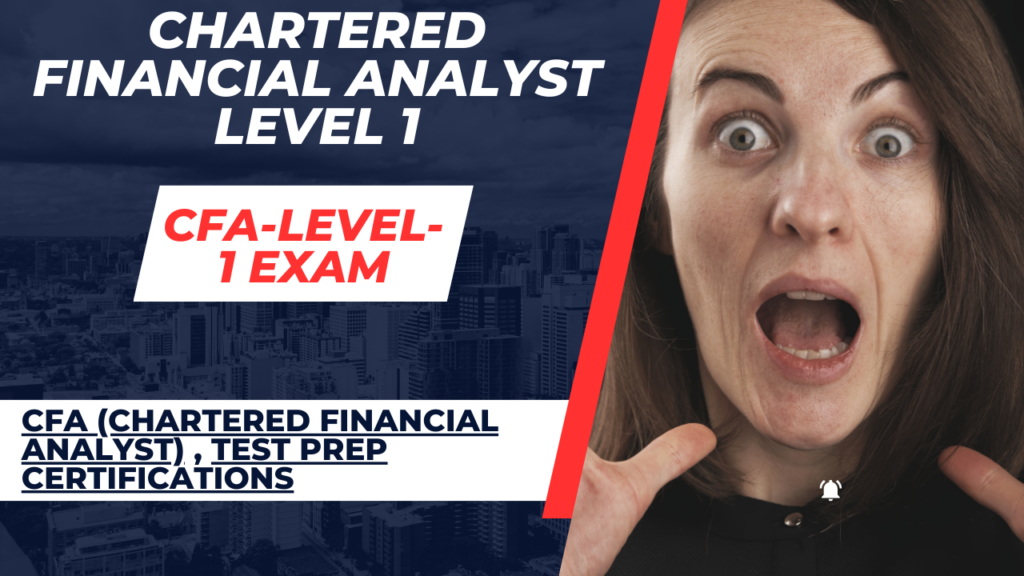Key Takeaways:
- Gain insight into CFA® exam question formats.
- Focus on fixed-income topics.
- Level I examples with answers provided.
Unlock CFA® Success:
Explore CFA® exam question structures and answers, emphasizing fixed-income topics at Level I for a targeted exam preparation approach.
CFA® Exam Sample Questions Overview
For an insight into the CFA® exam, review the question formats at each level. This article focuses on fixed-income topics and provides examples with answers.
Level I Exam Questions
The Level I exam comprises multiple-choice questions with three options. The questions range from open-ended statements to data evaluation. CFA Institute details the format on its website; additional insights on the Level I exam are available here. Below are fixed-income Level I question examples:
- If the market yield remains constant, what happens to the price of a Treasury bill as it approaches maturity?
A. Increases
B. Decreases
C. Stays the same
- For a bond with a duration of 8.54 and convexity of 58.66, what is the closest percentage price change for a 20 basis point increase in yield?
A. –1.696%
B. –1.708%
C. –1.720%
- From Treasury securities data, what is the best estimate of the one-year implied forward rate three years from now?
A. 2.91%
B. 3.12%
C. 3.20%
- Evaluate the following statements:
Statement 1: A putable bond shows negative convexity at low yields and positive convexity at high yields.
Statement 2: Effective duration measures a bond's price sensitivity to changes in yield to maturity.
A. Both statements are correct.
B. Exactly one statement is correct.
C. None of the statements are correct.
Trimming unnecessary content and ensuring clarity is crucial for effective communication.
Introduction To The CFA-Level-1 Exam Dumps - Chartered Financial Analyst Level 1
Are you planning to take the Chartered Financial Analyst CFA Level 1 Exam Example? Preparing for the CFA Level 1 Exam can be a daunting task. To help you prepare, this article provides tips and strategies to help you succeed. From studying the right material to creating a study plan, this guide covers everything you need to know to ace the CFA Level 1 Exam. With the right preparation and strategies, you can feel confident and prepared on exam day.
Establishing a Study Plan for the CFA Level 1 Exam Example
The first step in creating a study plan for the CFA Level 1 Exam Example is to determine the amount of time you have available to dedicate to studying. This will help you to determine how much time you need to allocate to each subject and how many hours per week you need to devote to studying. It is important to set realistic goals and make sure that you can meet them.
Once you have determined the amount of time you have available to dedicate to studying, it is important to create a schedule that outlines when you will study and for how long. This will help you to stay on track and ensure that you can cover all of the material in the allotted time. It is also important to make sure that you are taking regular breaks throughout the day to stay focused and motivated.
In addition to creating a schedule, it is important to set specific goals for each study session. This will help you to stay motivated and ensure that you are making progress towards your goal of passing the CFA Level 1 exam. It is also important to make sure that you are studying in a quiet and comfortable environment that will allow you to focus and concentrate on the material.

Finally, it is important to make sure that you are utilizing the available resources to help you prepare for the CFA Level 1 Exam Example. This includes utilizing practice exams, attending review classes, and reading study guides. All of these resources will help you to become familiar with the material and ensure that you can answer the questions correctly on the exam.
Establishing a study plan for the CFA Level 1 exam is essential for success. By creating a schedule, setting specific goals, and utilizing the available resources, you will be able to effectively prepare for the exam and ensure that you can pass it.
Understanding the CFA Level 1 Exam Structure and Content
The CFA Level 1 Exam consists of two three-hour sessions, each containing 120 multiple-choice questions. The exam covers a wide range of topics, including ethical and professional standards, quantitative methods, economics, financial reporting and analysis, corporate finance, equity investments, fixed income, derivatives, alternative investments, and portfolio management.
The exam is divided into two sections: the morning session and the afternoon session. The morning session covers ethical and professional standards, quantitative methods, economics, and financial reporting and analysis. The afternoon session covers corporate finance, equity investments, fixed income, derivatives, alternative investments, and portfolio management.
The CFA Level 1 Exam is designed to test a candidate’s knowledge of the core concepts of the CFA program. It is a rigorous assessment that requires a comprehensive understanding of the material. Candidates must demonstrate their mastery of the material by correctly answering a minimum of 70% of the questions in each session.
To prepare for the CFA Level 1 Exam, candidates should review the CFA Institute’s study materials, which include the CFA Program Curriculum, CFA Program Study Guide, and CFA Program Practice Exams. Candidates should also familiarize themselves with the CFA Institute’s Code of Ethics and Standards of Professional Conduct.
The CFA Level 1 Exam is a challenging assessment that requires dedication and hard work. However, with the right preparation and dedication, candidates can successfully pass the exam and move on to the next level of the CFA program.
Utilizing Practice Tests and Mock Exams for CFA Level 1 Exam Preparation
Practice tests and mock exams are available in a variety of formats, including online, printed, and audio. Online practice tests and mock exams are typically timed and provide instant feedback, so you can quickly identify areas of improvement.
Printed practice tests and mock exams are a great way to get comfortable with the exam format and question types, and they also allow you to practice taking the exam in a more traditional format. Audio practice tests and mock exams are a great way to get comfortable with the exam content and format, and they also allow you to practice taking the exam in a more relaxed setting.
When taking practice tests and mock exams, it is important to focus on the content areas that are most likely to be tested on the actual exam. The CFA Institute provides a comprehensive list of topics that are likely to be tested on the exam, so you can use this list to focus your practice test and mock exam efforts.
Additionally, it is important to use practice tests and mock exams to identify areas of strength and weakness. This will allow you to focus your study efforts on the areas that need the most improvement.
Finally, it is important to use practice tests and mock exams to get comfortable with the exam format and question types. The CFA Institute provides sample questions and practice exams that can be used to familiarize yourself with the exam format and question types. Additionally, many online practice tests and mock exams provide instant feedback, so you can quickly identify areas of improvement.
Utilizing practice tests and mock exams for CFA Level 1 Exam preparation is an essential part of any successful study plan. Practice tests and mock exams provide a valuable opportunity to familiarize yourself with the exam format, question types, and content areas.
They also allow you to identify areas of strength and weakness, so you can focus your study efforts accordingly. By utilizing practice tests and mock exams, you can increase your chances of success on the CFA Level 1 Exam.
Developing Time Management Strategies for the CFA Level 1 Exam Example
The first step in developing a successful time management strategy is to create a study plan. Start by breaking down the exam into manageable chunks. Create a timeline that outlines when you will cover each topic and how much time you will spend on each one. Be sure to include time for review and practice tests.
Once you have a timeline in place, it is important to stick to it. Make sure you set aside time each day to study and stick to that schedule. If you have difficulty staying on track, try setting daily or weekly goals for yourself. This will help you stay motivated and focused on your studies.

Another important time management strategy is to use practice tests. Practice tests are a great way to gauge your progress and identify areas where you need to focus your efforts. Make sure to set aside time to take practice tests and review the results. This will help you identify any areas where you need to spend more time studying.
Finally, make sure to take regular breaks. It is important to give your mind a break from studying to help you stay focused and motivated. Taking breaks will also help you retain the information you have studied.
By following these strategies, you can ensure that you make the most of your study time and maximize your chances of success on the CFA Level 1 exam. With proper planning and organization, you can make sure you are well-prepared and ready to take the exam.
Leveraging Resources to Supplement CFA Level 1 Exam Preparation
There are a variety of resources available to supplement your CFA Level 1 exam preparation. The most important resource is the CFA Institute’s official curriculum. This is the official source of information for the exam and should be your primary source of study material. The curriculum provides an overview of the topics covered on the exam, as well as sample questions and practice exams. It is important to thoroughly review the curriculum and make sure that you understand all of the material.
In addition to the official curriculum, there are a variety of other resources available to supplement your CFA Level 1 exam preparation. These include textbooks, study guides, online courses, and practice exams.
Textbooks and study guides provide a comprehensive overview of the topics covered on the exam, as well as practice questions and sample exams. Online courses provide an interactive learning experience and can be a great way to review the material and prepare for the exam. Practice exams are also available and can help you identify any areas of weakness and focus your study time accordingly.
Finally, it is important to leverage the resources available to you to maximize your study time and ensure that you are as prepared as possible for the exam. Utilizing the resources available to you can help you identify any areas of weakness and focus your study time accordingly.
Additionally, utilizing resources such as textbooks, study guides, online courses, and practice exams can help you stay organized and on track with your study plan. By leveraging resources to supplement your CFA Level 1 exam preparation, you can ensure that you are as prepared as possible for the exam.
Conclusion
paring for the CFA Level 1 Exam can be a daunting task, but with the right tips and strategies, you can make sure you're ready to take on the challenge. By taking the time to create a study plan, review the material, and practice test-taking strategies, you can ensure that you are fully prepared for the exam. With the right preparation, you can be confident that you will be able to pass the CFA Level 1 Exam and move on to the next level of your career.
Comments (0)